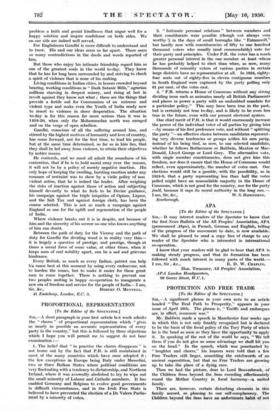PROPORTIONAL REPRESENTATION [To the Editor of the SPECTATOR.] SIR,—A short
paragraph in your first article last week admits the "charm " of proportional representation which -" gives as nearly as possible an . accurate representation of every party in the country," but this is followed by three objections which I hope you will permit me to suggest do not bear examination :--
1. The belief that "in practice the charm disappears" is not borne out by the facli that P.R. is still maintained in most of the many countries which have once adopted it ; the few exceptions in Europe being Italy under Mussolini, two or three Balkan States where political conditions are very fluctuating with a tendency to dictatorship, and Northern Ireland, where it was avowedly abolished to try to wipe out the small minority of Labour and Catholic members. It has enabled Germany and Belgium to evolve good governments in difficult circumstances, and in the Irish Free State is believed to have prevented the election of a De Valera Parlia- ment by a minority of votes.
- 2. "Intimate personal relations" between members and their constituents were possible (though not always very worthy !) in the days of small boroughs.like " Eatanswill," but hardly now with constituencies of -fifty to one hundred thousand voters who usually (and- commendably) vote for their party and principles. Under P.R. the voter has a much greater personal interest in the one- member at least -whom he has probably helped to elect than when, as now, many thousands of minority voters of various parties in certain large districts have no representative at all. In 1924, eighty- four seats out of eighty-five in eleven contiguous counties in. South England were captured by the party polling only
01 per cent. of the votes cast. - 3. "P.R. returns a House of Commons without any strong dividing issue such as animates nearly all British Parliaments and places in power a party with an undoubted mandate for a particular policy." This may have been true in the past, but is certainly not true to-day, and is likely to be even less true in the future, even with our present electoral system.
One chief merit of P.R.- is that it would enormously increase the power of the individual voter of all parties by giving him —by means of his first preference vote, and without splitting the party "—an effective choice between candidates represent, bag very diverse tendencies or groups within his own party, instead of his being tied, as now, to one selected candidate; whether he follows Rothermere or Baldwin, Maxton or Mac- Donald, Lloyd . George or Lord -Grey. The alternative vote, with single -member constituencies, does not give him this freedom, nor does it ensure that.the House of Commons would reflect, even approximately,- the number of votes cast. Our elections would- still be a gamble, -with the possibility, as in 1924-9, that a party representing less than half the votes polled might have an unassailable majority in the House of Commons, which is not good for the country, nor for the party itself, because it saps its moral authority in the long run.--:






































 Previous page
Previous page